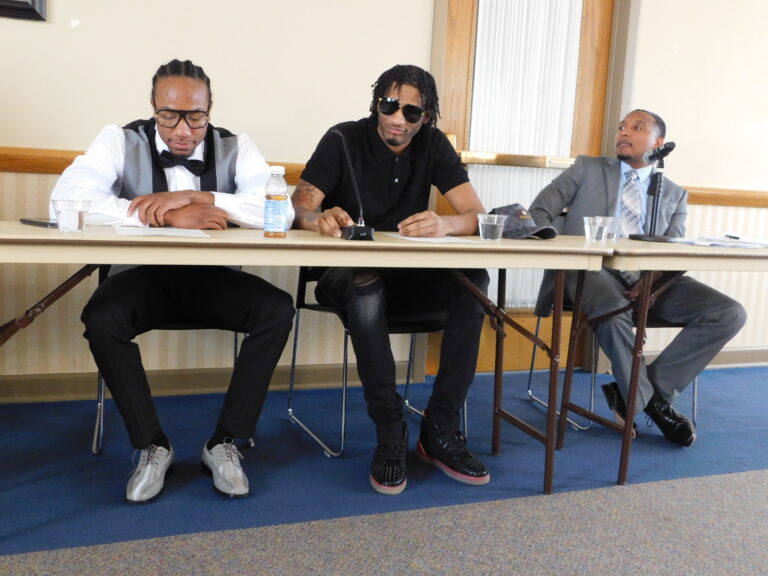DEKALB — Several times a week, a team of NIU graduate students led by professors Zach Wahl-Alexander and Jenn Jacobs bring physical activities to three juvenile justice youth centers in northern Illinois. Wahl-Alexander and Jacobs teach in the school’s Department of Kinesiology and Physical Education and have run the program for the past four years.
The initiative is called Project FLEX. It stands for “fitness, leadership experience.” They play basketball and pickleball, they even offer boxing with the incarcerated youth — but the experiences are really what stand out to them.
Listen to this story here.
One incarcerated Project FLEX participant has been incarcerated for four years. He’s still just 19 years old. With Project FLEX, he’s also been able to visit NIU’s campus a few times.
“It just made me realize that there’s more to the world,” he said. “We sat in Dr. Jacobs’ class and I feel like the four or five of us that were there from the facility raised our hand more than the students.”
He says — like a lot of teenagers who’ve experienced incarceration — he never pictured himself as someone who could go to college. The teen says you don’t feel “normal” that often when you’re in jail. College seems like something people do in movies. But it was eye-opening to walk around campus and see that he could fit in like any other 19-year-old studying in the student center or eating at the dining halls.
His most recent trip to NIU was to talk about his experience in the program along with other incarcerated and formerly incarcerated Project FLEX participants at an event called “Beyond the Ball: Reimagining the Role of Sport in Juvenile Justice.”
Diasee Scott is a 24-year-old musician from the south side of Chicago. He’s also formerly incarcerated and went through Project FLEX.
“Some of us may never have been to college, may never have stepped foot in one. But when you actually go. You get the vibe. You change your mindset and give yourself something to work towards,” said Scott.
NIU has expanded Project FLEX over the past few years. Since 2018, it’s gone from just one graduate student working on the project to a group of 10. Zach Wahl-Alexander says they’re at the youth facilities for four or five hours, sometimes four days a week.
Most programs at the facility are only once a week, so Scott says the amount of time NIU grad students spend with the incarcerated youth really helps build relationships and trust.
“They treat you like an actual person. And they don’t look at you as far as your situation or what you’re going through. They respect your privacy and respect your opinion,” he said.
Another participant is also 19 and has been incarcerated for four years. He’s in his last year. Which means he’ll be getting out soon, maybe looking at colleges. His Project FLEX friends hope he’ll choose to become a Huskie at NIU.
He spent the first year and a half with project FLEX standing off to the side, slowly getting to know people before he started actively participating. He says Project FLEX members like Dr. Jacobs would come talk to him, remember his name every week, show they actually cared.
A lot of the activities at the project are based around communication skills. It’s hard to win team sports without them. And they teach lessons that will help in their everyday lives.
But for Project FLEX alum Malcolm Turner, it was also nice to come and let go of the stress of being in jail, being locked up and away from your friends and your family.
“I looked at it like, man, I’m gonna do this boxing and blow off some steam — and I did. I took that boxing and ran with it. And it helped me become a better person,” said Turner.
Professor Zach Wahl-Alexander says he thinks Project FLEX does make a positive impact on the outcomes of the youth that go through it. He hopes they can expand too. He wants to bring Project FLEX to the two youth centers they’re not in and even replicate it in other states.
A decade ago, 1,200 young people were locked up in youth centers in Illinois. Now, that number is around 100. There’s also a movement in Illinois aiming to get that number to zero in favor of community investment.
For the incarcerated young people like the teen who was inspired by his trips to NIU, Project FLEX helps him, for the first time, feel excited about the possibilities in his future; his education and what he can do with his life after he gets out.
“I’d be thinking about the small things,” he said. “Like am I gonna run out the gates? Am I going to skip? What am I supposed to feel at that moment? Then to see my family and just knowing we don’t have somebody watching this. I’m home. It’s back. We’re back.”
And maybe, with the help of Project FLEX, a way forward.

